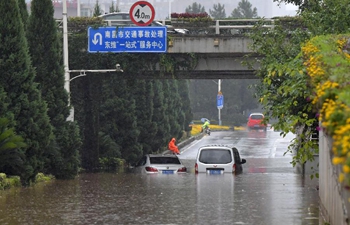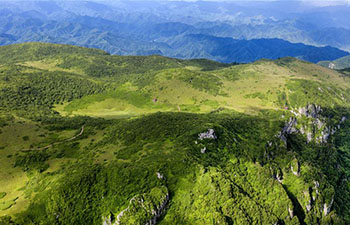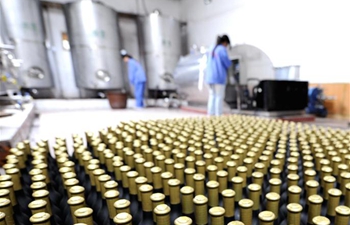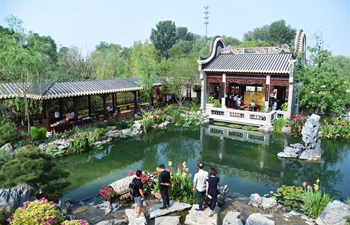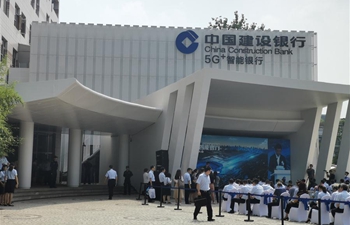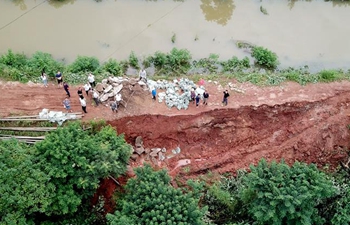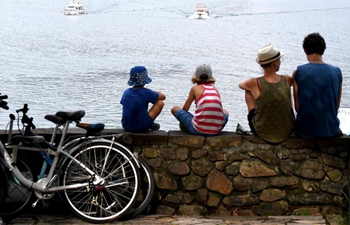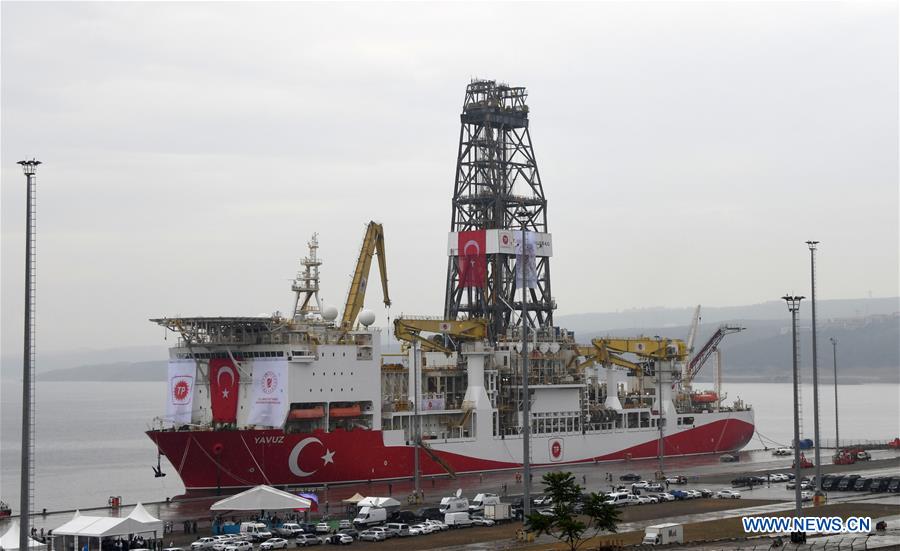
Photo taken on June 20, 2019 shows the drilling vessel Yavuz at a port in Kocaeli province, Turkey. The European Union's threat of sanctions is unlikely to deter Turkey from drilling for gas near Cyprus' coasts while the tension between the EU and Turkey would not turn into a full-blown crisis, analysts told Xinhua. (Xinhua/Xu Suhui)
ISTANBUL, July 13 (Xinhua) -- The European Union's threat of sanctions is unlikely to deter Turkey from drilling for gas near Cyprus' coasts while the tension between the EU and Turkey would not turn into a full-blown crisis, analysts told Xinhua.
The sanctions that the EU is said to be planning to impose would not refrain Turkey from conducting drills, said Celalettin Yavuz, a security and foreign policy analyst.
The EU, of which the Republic of Cyprus representing the Greek Cypriots only and Greece are members, has repeatedly warned Ankara to stop its drilling efforts.
The latest EU warning came in the past week when Yavuz, a drilling ship that Turkey sent off the eastern coast of the divided island, was readying to start drilling.
"I don't expect Turkey to backtrack, nor should it," said Faruk Sen, chairman of the Istanbul-based Turkish European Foundation For Education and Scientific Studies.
Turkey and the Republic of Cyprus are at loggerheads over the Greek Cypriots' gas exploration off southern Cyprus.
Turkey and the Turkish Cypriots, who live in the northern part of the Cyprus island, argue that the Turkish Cypriots should also have a share of the revenues of the gas to be drilled.
Cyprus was split along ethnic lines in 1974, when Turkey intervened militarily following a military coup by Athens-backed Greek Cypriots.
The sanctions recently reported by the media would have no deterrence for Ankara, said Yavuz, who teaches at Istanbul Ayvansaray University.
According to reports in the past week, the EU agreed on a draft plan of sanctions against Turkey for its drilling activity which the EU and the Greek Cypriots call "illegal."
The EU and the Greeks say the areas where the two Turkish drilling ships work on behalf of the Turkish Cypriots are part of the Republic of Cyprus' exclusive economic zone, while Ankara argues the ships function within Turkey's continental shelf.
Suspending high-level dialogues and negotiations on the Comprehensive Air Transport Agreement with Turkey as well as reducing EU's pre-accession funds for next year are reportedly among the steps Brussels is planning to take against Ankara.
The sanctions in question are not strong enough to put Turkey under significant pressure, said Can Baydarol, an analyst on EU-Turkey relations.
"A high-level dialogue between the two sides is almost non-existent, while the EU's financial aid to Ankara represents no significant amount," Baydarol added.
Since 2005, Turkey has been holding talks with the EU to become a full member of the bloc and receives financial aid from the EU to this end each year.
However, the talks, which were long stalled, were de facto suspended by the EU following the failed coup in Turkey in 2016.
Brussels accuses Ankara of increasing authoritarianism and violations of the rule of law while Ankara complains of unfair treatment by Brussels.
The EU is planning to halve the amount of funds that Turkey is scheduled to get in 2020, said Sen.
The draft sanctions will reportedly be finalized in a meeting of EU foreign ministers on July 15.
The report about potential EU sanctions came after Donald Tusk, president of the European Council, accused Ankara on July 10 of challenging the sovereignty of the Republic of Cyprus and signalled that EU sanctions would follow.
Without any sign of retreat in its position, Ankara said any EU sanctions would backfire and not go unanswered.
Turkey would increase its activities in Cyprus in the event of EU sanctions, Turkish Foreign Minister Mevlut Cavusoglu said Friday.
However, analysts think the EU is not likely to put tougher sanctions against Turkey as that could lead to a major confrontation.
"Common interests in Turkish-EU ties are much stronger," said Baydarol.
"The EU would not like to antagonize Turkey, a regional power," said Yavuz, noting alliances are shaky in the post-Cold War era and the United States is no longer a reliable partner for Europe.
In response to possible EU sanctions, Ankara may "play the refugee card" against the EU by allowing refugees on its territory to travel illegally to Europe.
Ankara concluded a deal in 2016 with Brussels to prevent irregular migrants from travelling to Europe, a nightmare scenario for the EU, in return for EU's funding for Syrian refugees in Turkey.
Yavuz does not think that "playing the refugee" card would work.
Since 2016, both Greece and Bulgaria, Turkey's neighbors in Europe, have already beefed up measures along the border and on the Aegean Sea, he noted.
In response, Turkey may instead say it would establish a permanent military base in the Turkish-controlled northern Cyprus, Yavuz remarked.
According to local media, Turkey is planning to set up a naval base in northern Cyprus where the self-declared Turkish Republic of Northern Cyprus rules.
Since 1974, numerous UN-led attempts to reunify the island under a federal administration have failed.
In February, U.S. Exxon Mobil, commissioned by Greek Cypriots, announced that it struck a natural gas resource of approximately 5 trillion to 8 trillion cubic feet (142 billion to 227 billion cubic meters) off Cyprus.

